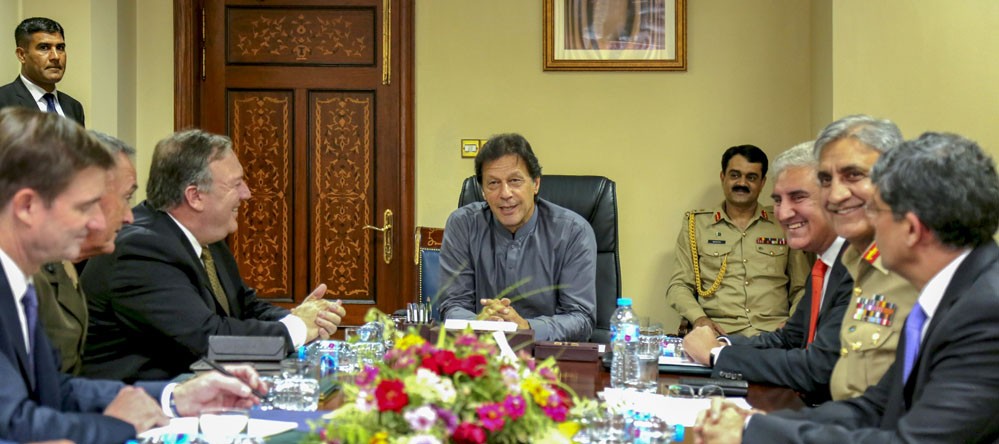
As things stand, Pak-US interests in security and economic wellbeing are poised to diverge even further

We have grown into the habit of conceiving political arena as if it were the extension of our social relationship. Every time, a high profile American official is on a visit to Pakistan, an exercise in déjà vu revisits: what we have been doing for the US remains unacknowledged, protest politically novices.
The very core value of politics in general and international politics in particular is that politics is the realm of national interests as defined by the ruling elites of a country at a particular time. Nevertheless, seen through the lens of neo-realism, the quest for security is a given fact: it is the international anarchy, the absence of any regulatory authority above states, which determines that the pursuit of security dwarfs other national interests irrespective of the choice of ruling elites.
No matter what is the political dispensation, democracy or otherwise, of a country or its relative position in the overall configuration of power, the quest for survival is the first and foremost goal which states, major or small, seek for the same reason: anarchy equally applies to every state!
Going through the pages of history, the basic stimulus for Pak-US relationship, an alliance or a partnership, has come from the United States. With its overriding concern of containing erstwhile Soviet Union during the Cold War years, Washington, in the South and South East Asian contexts, sought to forge defence alliances with countries that were strategically well placed to thwart Soviet expansion.
In South Asia, India, mainly because of its huge territorial landmass and being world’s largest democracy, was the US’ preferred choice to recruit it to act as a counterweight to Soviet Union. It took Washington no less than half a decade to figure out that Delhi was uncommitted to play American proxy. Pakistan became a readily available second option to sell its services mainly to buy security. Pakistan subscribed to US-sponsored defence alliances, SEATO and CENTO, in South Asia and South East Asia but for its own reasons. Policy makers in Karachi conceived Delhi as the gravest security threat to its territorial integrity.
Does this mean that security was not a concern for India while it was one for Pakistan?
As a matter of fact, in its initial years, threat to the security of the incipient state of Pakistan emanated from its much bigger and more powerful neighbour India than the other way round. As the 1962 India-China border clash demonstrated, China became an overriding security concern for India. The communist state did not pose as a security threat to India or at least Indian policymakers under Nehru did not treat it that way.
What has changed this time?
Unlike the Cold War era, when India did not consummate an alliance with the US, Delhi has been forthcoming in forging a strategic relationship with Washington since 2005 when a nuclear cooperation deal between the United States and India was signed. Cooperation since then has expanded to other areas too. In Afghanistan, both countries support Afghan national government though American policy has been more of running with the hare and hunting with the hounds. Similarly, both strategic partners oppose China Pakistan Economic Corridor, a flagship project of One Road, One Belt project. OBOR is seen as China’s bid to world supremacy, a prospect that the US wants to ward off.
The US is in a dilemma. History is a stark reminder that it is very hard, if not impossible altogether, to strike a balance between India and Pakistan, the two belligerent neighbours. American support to one has invariably elicited an adverse response from the other.
In the present context, India and the US see in China a common force to be reckoned with. Both have joined forces to prevent the domination of Asia by China. This has led to Pakistan to voice its concerns that throughout history when Pakistan needed the US, the latter has always shirked its responsibility and has favoured India instead. As a result, Pakistan has looked towards China more than before. Both share a common interest in the success of CPEC.
China, under the corridor, has been financing infrastructure and energy projects though not out of altruism. Similarly, India-America friendship is a blessing in disguise for Pakistan in yet another way. Russian foreign policy is geared towards envisioning a multipolar world order whereby the US supremacy does not go unchallenged. The odds are that in the coming years Indo-US strategic partnership will draw China, Pakistan and Russian even closer to one another.
US Secretary of State Mike Pompeo’s visit to Islamabad brought into sharp focus the divergence of interests between Pakistan and the United States. Merely a few days ahead of Pompeo’s visit, the US Department of Defence announced a permanent aid cut-off of $300 millions to Pakistan due on the head of Coalition Support Fund. In his five-hour long stay, Pompeo has asked for delivering on American demand of bringing Taliban to negotiating table. American frustration emanates from convergence of interests between China and Pakistan and Pakistan and Russia on the one hand and Pakistan and Iran on the other hand.
As things stand, Pak-US interests are poised to diverge even further. Both crave for security as the topmost priority followed by economic wellbeing and prosperity. Means to these goals are different and, at times, conflicting. The future appears not uncertain: the past seems to be the future of Pak-US relations. Pakistan has honed the skill of adapting to circumstance without compromising much on its conceived national goals.